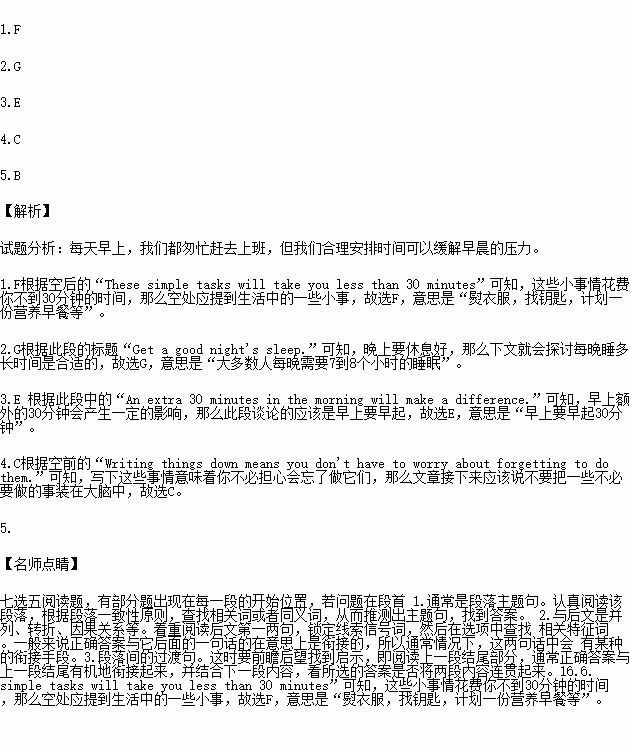题目内容
根据短文内容,从短文后的A—G选项中选出能填入空白处的最佳选项。选项中有两项为多余选项。
Many of us deal with the rush every morning in preparation for work or school, but it doesn't have to be this way. With a little time management, these steps can help you cut down on your morning stress.
Create an evening preparation routine
1. These simple tasks will take you less than 30 minutes to complete each evening and will save you a huge headache every morning.
Get a good night's sleep
Make sure you go to bed at a reasonable hour to allow enough time for a healthy night's sleep. Most people require between seven and eight hours' sleep each night. If needed, set a bedtime reminder alarm on your alarm clock. 2.
Wake up 30 minutes earlier
An extra 30 minutes in the morning will make a difference. As long as you get to bed on time, waking up 30 minutes earlier should seem natural after just a few days. 3.
Plan a realistic day
Writing things down means you don't have to worry about forgetting to do them. 4. Write down anything that cannot be put off to following day.
5.
Getting up to face a new day is far more satisfying when you have something to look forward to. Make sure you manage your time better so that you have time to do something you love on a daily basis.
A.Morning stress is very common.
B.Schedule something you love daily.
C.Never fill your mind with unnecessary worries.
D.Make a summary of what you did in the daytime.
E.Use this time to think, shower and eat breakfast.
F.Iron your clothes, locate your keys, plan a nutritious breakfast, etc.
G.Always keep the temperature in your bedroom comfortably cool.
实现有效的沟通,建立良好的人际关系,不仅要善于言表,更要学会倾听。请你根据下表中所提供的信息,写一篇题为“Being a Good Listener”的英文演讲稿。
为何倾听 | 表示尊重,增进理解,建立良好的人际关系 | |
谁来倾听 | 家长倾听孩子 | 理解孩子,消除代沟,…… |
老师倾听学生 | 了解学生,满足需求,…… | |
同学相互倾听 | 增进友谊,互帮互学,…… | |
怎样倾听 | (请考生联系自己拟定内容,列举两至三点。) | |
注意:
1. 词数120左右;
2. 题目已为你写好;
3. 行文连贯,语篇完整;
4. 文中不得透露个人真实信息。
Good afternoon, everyone!
The topic of my speech today is “Being a Good Listener”. __________________
_______________________________________________________________________________
_______________________________________________________________________________
_______________________________________________________________________________
_______________________________________________________________________________
_______________________________________________________________________________
_______________________________________________________________________________
_______________________________________________________________________________
_______________________________________________________________________________
_______________________________________________________________________________

